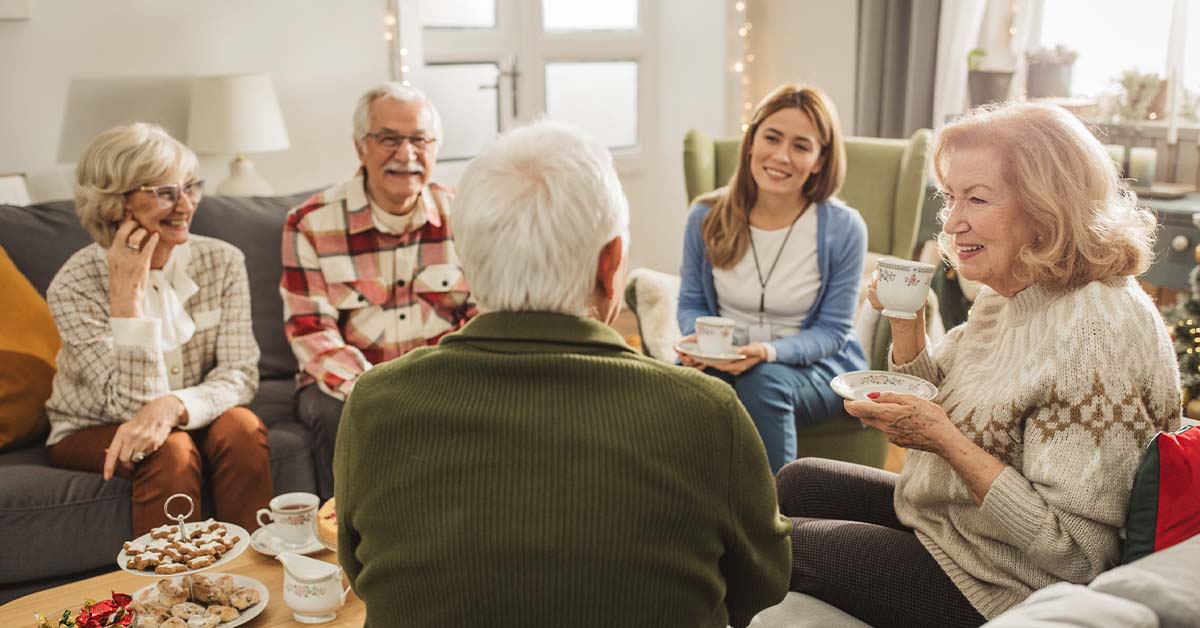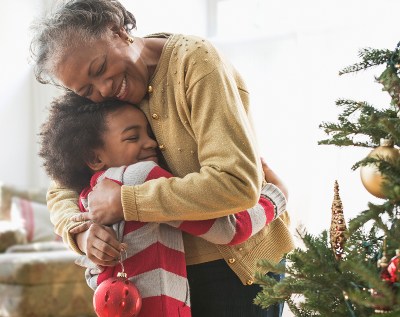How Hospice Patients and Their Caregivers Can Embrace the Holidays
By Jason Cooper, MDiv, National Spiritual Lead / Supportive Services

Expectations of togetherness, joy, and celebration are a natural part of the holidays. Yet this season can also amplify feelings of loss, grief, and uncertainty when a family member is nearing the end of their life.
As you approach the holidays, realize that grief and joy can coexist. Grief is a natural part of the end-of-life journey. Still, it’s okay to find moments of joy and connection even amidst sadness. Embrace the idea that both emotions can exist simultaneously.
How Family Members Can Navigate the Holidays
- Set realistic expectations. Depending on the hospice patient’s health, you may need to adapt or simplify family traditions. Consider what will be most meaningful and comfortable for your loved one as well as others.
- Recognize mixed emotions. Everyone in the family may be experiencing a mix of sadness and anxiety, love and gratitude. Let everyone express how they feel without judgment to create a supportive environment.
- Avoid over-scheduling. Don’t feel the pressure to attend every event or uphold every tradition. Focus on what feels most important and nurturing for the family during this time.
- Let go of perfection. The holidays don’t need to be "perfect" to be meaningful. What matters is time together in a small gathering, a quiet moment, or just being in the same room with your loved one.
- Look for what you can control. Understand that this holiday season will be different, and that’s okay. Rather than focusing on what has been lost or what can’t be done, embrace what is possible.
Ensure the Comfort of the Hospice Patient
Your loved one in hospice may feel increased emotional stress. The holiday season often heightens sadness, anxiety, or loneliness. Changes in routine, colder weather, or stress can make physical symptoms worse, including pain, shortness of breath, or fatigue. To manage this:
- Evaluate energy levels and honor your loved one’s preferences. They may have limited energy to participate in large gatherings or long celebrations. Respect their physical and emotional needs. If a gathering is too large or noisy, it may overwhelm them.
- Consider their capabilities. A long drive or events outside the home may cause fatigue and discomfort. Activities that require significant effort or movement can exacerbate pain.
- Monitor their comfort level. Check frequently to make sure their space is comfortable. Adjust pillows, keep them warm, or play soothing music.
- Let your loved one guide the conversation. You may feel sensitive about discussing topics related to death, loss, or future events. If your loved one wants to talk, and you’re comfortable discussing the topic, dive in. Talk about legacy or hopes and dreams for family members.
If your loved one is in an inpatient unit or isolated in a separate room, it can be helpful to bring “home” into their room with a special blanket, plant, ornaments, or favorite lamp. Visit often to ensure they don’t feel left out.
Make Meaningful Memories
Focus on personal connection and keep gatherings small and calm. Prioritize emotional support and being present. Suggestions include:
- Share meaningful memories. Look through old photo albums or reminisce about past holidays. Think about a grandparent or aunt or uncle who started every holiday event by repeating the same story. Others rolled their eyes because they’d heard it a thousand times. This can be a powerful time to gather and share those memories or create a memory box where family members can contribute notes, photos, or tokens that honor the loved one’s life.
- Watch holiday movies or listen to holiday music. Create a cozy atmosphere with familiar, soothing songs or films.
- Engage in small, cherished traditions. Light candles, decorate a small tree, or enjoy a favorite holiday treat together in a relaxed manner.
- Write or record messages. Help your loved one write letters or record messages for family members.
Caregivers: Practice Self-Care
The demands on caregivers can be intense. Take care of your own physical and emotional health through rest, seeking support, or finding moments of solitude.
Keep in mind that hospice workers support families through difficult transitions, including the holidays. If a loved one needs help, VITAS is available for them day or night. The hospice team can provide medication, guide you in managing your loved one’s symptoms, and suggest ways to create a peaceful environment.
Recommendations for family caregivers:
- Lean on the hospice team. Hospice care also provides emotional support, grief counseling, respite care, and support groups. These resources can help families process emotions during a time that might feel overwhelming.
- Ask for help. If you’re feeling overwhelmed, reach out to hospice staff, other family members, or friends. Caregiving can be emotionally exhausting. Accepting support can help maintain your own well-being.
Consider Future Holidays Now
Navigating holidays with a loved one on hospice care is a delicate balance of honoring the present moment, preserving meaningful traditions, and acknowledging grief and emotions. Compassion, flexibility, and open communication can help families find peace and connection during what is often a challenging time.
After the holiday season, grief may become more pronounced, especially if it’s your first holiday without your loved one. Knowing this will be difficult can help you prepare emotionally. Plan for your grief. Many find comfort in continuing some of the traditions they had with their loved one, even in their absence.
Key Takeaways:
- Embrace the idea that joy and sadness can coexist.
- Focus on the comfort of your loved one in hospice.
- Use the holidays to create meaningful memories.
- Lean on your hospice team and practice self-care.
- Plan for your grief.

